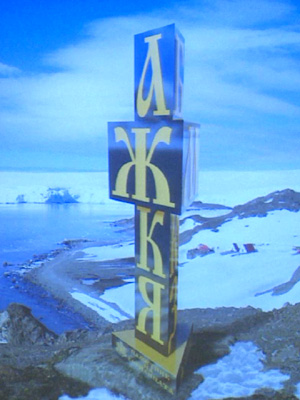The Cyrillic alphabet will have a monument in Antarctica and the idea for this belongs to Bulgaria and Mongolia. Mongolia’s involvement may seem strange to some, but it should be remembered that it is one of few non-Slavic nations that uses the Cyrillic alphabet. A year ago, President Rosen Plevneliev unveiled the first such monument in the capital of Mongolia Ulan Bator. As the leader of Bulgaria’s Antarctic expedition Hristo Pimpirev says, it will be a symbol of friendship between the two nations and their cooperation in science which goes back ten years. It will also convey a message of peaceful coexistence in a peaceful world, a world without wars or rivalry, as is the world in Antarctica.
More about the monument from Mladen Stanev, chairman of the Bulgarian-Mongolian Friendship Society:
 “We are now into the final arrangements. We shall be taking earth from Veliko Turnovo, Sofia, Pliska, Preslav, Varna as well as from the grave of Khan Kubrat in Malaya Pereshchepina. We are now waiting for the images of Cyril, Methodius and St. Kliment to be engraved onto the letter Ж. So, I have endeavoured to make a monument that will endure, it is stable and made to last and is 2.30 meters high. The body is made of ferrochrome and the letters are of brass. Bulgaria is known first and foremost for its alphabet. It was an honour for me to create this monument which we shall put up on the South Pole.”
“We are now into the final arrangements. We shall be taking earth from Veliko Turnovo, Sofia, Pliska, Preslav, Varna as well as from the grave of Khan Kubrat in Malaya Pereshchepina. We are now waiting for the images of Cyril, Methodius and St. Kliment to be engraved onto the letter Ж. So, I have endeavoured to make a monument that will endure, it is stable and made to last and is 2.30 meters high. The body is made of ferrochrome and the letters are of brass. Bulgaria is known first and foremost for its alphabet. It was an honour for me to create this monument which we shall put up on the South Pole.”
The monument will be inaugurated next year when the 25th Bulgarian expedition will leave for the Antarctic. It will be joined by Doychin Boyanov and Nikolay Petkov – two mountain climbers who have conquered Everest. It will be their mission to climb the peaks Simeon, Boris and Levski on Livingstone Island. Transporting the monument to the southernmost point on the planet will be a very tough job. A cargo plane will take it to the southernmost town in Chile, Punta Arenas. From there it will be loaded onto a ship, and for the final stretch, onto several boats, as no ship can berth on the island. The monument will be attached to a rock near the Bulgarian Antarctic base, as protecting the environment in Antarctica is particularly important. Talks are currently being held with the St. Kliment Ohridski University, Sofia for finding a place to keep the monument on the premises, before its departure on 15 January.
English version: Milena Daynova
"The place in France where we draw together the future of our children in Bulgarian" - this is how Yaneta Dimitrova described her workplace - the Bulgarian Sunday School "Ivan Vazov" in Paris a year ago in a post on a social network. It is one of the 396..
21 February is International Mother Language Day, first proclaimed as such by UNESCO and later adopted by the UN General Assembly. The right to study and to speak one’s mother tongue, or native language, is a basic human right and a civil right..
152 years after the death of the Apostle of Freedom, the personality of Vasil Levski continues to excite Bulgarians, regardless of whether they are in the country or abroad. The Embassy of Bulgaria in Athens, Greece , has extended an invitation to the..
Exactly 3 years ago, on February 24, Russia’s invasion of Ukraine began – an event that woke up Europe 77 years after the end of World War II and called..

+359 2 9336 661
